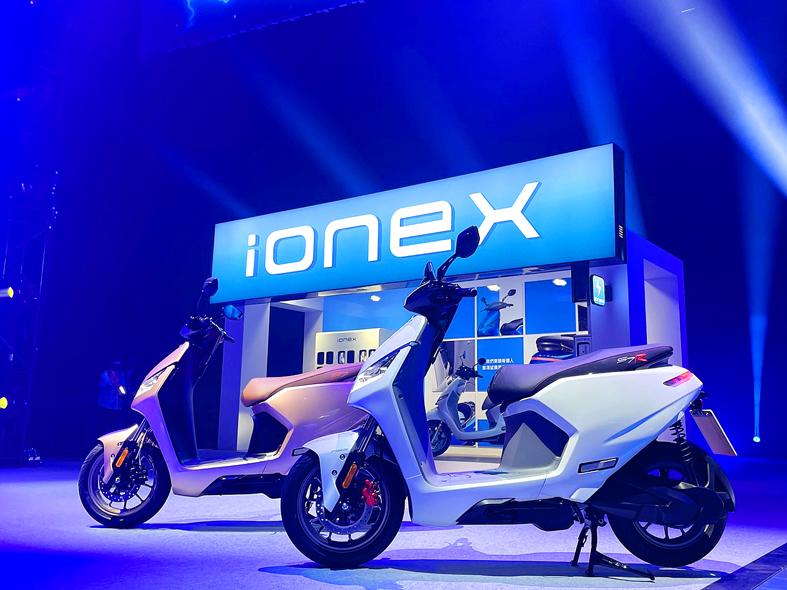Kwang Yang Motor Co (光陽工業) has set a target of raising electric scooter sales five-fold to 15,000 units next year, from an estimated 3,000 units this year, thanks to the extension of a government subsidy for electric scooter purchases and a broader distribution network.
Kwang Yang has been selling gasoline-powered scooters for more than 50 years under the KYMCO brand, while the company’s fully-owned Ionex Taiwan Co (台灣光捷) is responsible for building and selling Ionex-brand electric scooters.
“The company was greatly affected by the [COVID-19] pandemic from April, when we started deploying our distribution network. The sales of Ionex scooters started an upswing from the end of August. We believe the growth will carry through December,” Ionex Taiwan chief marketing officer Johnson Lin (林振盛) said on the sidelines of a news conference in New Taipei City’s Sindian District (新店).

Photo: Amy Yang, Taipei Times
Ionex has a 5 percent share of the market and expects sales momentum to further rise next year, as it looks to boost its distribution network to 100 from about 30 this year, Lin said.
The government’s extension of a subsidy for electric scooter purchases to next year is an important incentive for the industry, which faces heavy spending on battery development and battery swapping stations deployment, he said.
The company has installed 709 battery swapping stations so far and is on track to hit 1,000 units by the end of the year, he said.
As of Tuesday, Ionex had sold 1,969 electric scooters this year, compared with market leader Gogoro Inc’s (睿能) 63,383 units, government data showed.
Aeon Motor Co (宏佳騰) was next with 7,228 units, followed by China Motor Corp (中華汽車) with 2,048 units, the data showed.
Gogoro operates more than 2,100 battery swapping stations in the nation, and aims to add 583 battery swapping points at CPC, Corp Taiwan’s (中油) service stations by the end of this year.

HANDOVER POLICY: Approving the probe means that the new US administration of Donald Trump is likely to have the option to impose trade restrictions on China US President Joe Biden’s administration is set to initiate a trade investigation into Chinese semiconductors in the coming days as part of a push to reduce reliance on a technology that US officials believe poses national security risks. The probe could result in tariffs or other measures to restrict imports on older-model semiconductors and the products containing them, including medical devices, vehicles, smartphones and weaponry, people familiar with the matter said. The investigation examining so-called foundational chips could take months to conclude, meaning that any reaction to the findings would be left to the discretion of US president-elect Donald Trump’s incoming team. Biden

INVESTMENT: Jun Seki, chief strategy officer for Hon Hai’s EV arm, and his team are currently in talks in France with Renault, Nissan’s 36 percent shareholder Hon Hai Precision Industry Co (鴻海精密), the iPhone maker known as Foxconn Technology Group (富士康科技集團) internationally, is in talks with Nissan Motor Co’s biggest shareholder Renault SA about its willingness to sell its shares in the Japanese automaker, the Central News Agency (CNA) said, citing people it did not identify. Nissan and fellow Japanese automaker, Honda Motor Co, are exploring a merger that would create a rival to Toyota Motor Corp in Japan and better position the combined company to face competitive challenges around the world, people familiar with the matter said on Wednesday. However, one potential spanner in the works is

SEMICONDUCTORS: Samsung and Texas Instruments would receive US$4.75 billion and US$1.6 billion respectively to build one chip factory in Utah and two in Texas Samsung Electronics Co and Texas Instruments Inc completed final agreements to get billions of US dollars of government support for new semiconductor plants in the US, cementing a major piece of US President Joe Biden administration’s CHIPS and Science Act initiative. Under binding agreements unveiled Friday, Samsung would get as much as US$4.75 billion in funding, while Texas Instruments stands to receive US$1.6 billion — money that would help them build facilities in Texas and Utah. The final deals mean the chipmakers can begin collecting the funding when their projects hit certain benchmarks. Though the terms of Texas Instruments’ final agreement is

Call it an antidote to fast fashion: Japanese jeans hand-dyed with natural indigo and weaved on a clackety vintage loom, then sold at a premium to global denim connoisseurs. Unlike their mass-produced cousins, the tough garments crafted at the small Momotaro Jeans factory in southwest Japan are designed to be worn for decades, and come with a lifetime repair warranty. On site, Yoshiharu Okamoto gently dips cotton strings into a tub of deep blue liquid, which stains his hands and nails as he repeats the process. The cotton is imported from Zimbabwe, but the natural indigo they use is harvested in Japan —